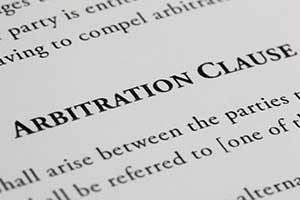The statute of frauds is a legal principal that requires certain contracts to be in writing in order to enforce them. It is traditionally reserved for contracts involving important or expensive subject matter, such as the sale of land, contracts for marriage, or the sale of goods totaling more than $500. In these instances, the contract is only enforceable if the terms of the agreement are in writing and it is signed by the party against whom the agreement is being enforced. It is used as a defense in cases where one party is suing another for breach of contract regarding one of the situations the statute covers. For…
-
Mental Incompetency in Guardianship and Divorce
It is not uncommon for courts to name one’s spouse as their guardian, but what happens when the incompetent party wants to get divorced from his wife and guardian? Can one be incompetent, yet understand the consequences of and express a desire to get divorced? Carolyn, the wife of an eighty-eight year old Kentucky man, Elmer Riehle, petitioned the court to appoint a guardian for her husband for financial reasons – to protect both herself and Elmer.[1] Carolyn decided to file the petition after Elmer sent thousands of dollars of the couple’s money to an e-mail scammer claiming to…
-
Six Things Every Lawyer Should Know When Drafting a Non-Compete Agreement in North Carolina
When advising clients and drafting employment contracts with non-compete clauses, there are several things every lawyer should keep in mind. The general rule is courts will enforce non-compete clauses to the extent they are reasonably necessary to protect legitimate business interests.[1] In North Carolina, they must be (1) in writing and (2) signed by the parties.[2] The following seven tips will strengthen a typical non-compete agreement and increase its likelihood of enforceability in a court of law: 1. Know Your State’s Disclosure Requirements Some, but not all, states require employers to disclose the existence of a non-compete clause…
-
Business Basics: The Duty of Good Faith and Fair Dealing and the Parol Evidence Rule
The duty of good faith and fair dealing is essentially the Golden Rule of Contract law and Business Law: treat others how you want to be treated, and you have a better chance of avoiding litigation. When parties run afoul of this duty, courts notice and hold them accountable. In Blondell v. Ahmed, the North Carolina Court of Appeals remanded a case where it believed the sellers of a home may have breached their duty of good faith and fair dealing under a Listing Agreement with their real estate agent.[1] In March of 2013, the sellers of a house,…
-
The Strict Blue Pencil Doctrine is Alive and Well in NC Courts
In a time where pencils and pens are quickly being replaced by keyboards, styli, and even one’s own fingers, the North Carolina Supreme Court ruled last week that the strict blue pencil doctrine remains alive and well – at least when it comes to non-compete clauses in employment agreements. The blue pencil doctrine originated in 1961 and essentially states that if a non-compete clause in an employment contract is “unreasonably broad,” then the Court has the power to use its blue pencil to literally strike the over broad provisions from the contract. Last week, in Beverage Sys. Of the…
-
Fourth Circuit: Arbitration Agreement in Employee Handbook Not Binding
A recent decision by the United States Court of Appeals for the Fourth Circuit ruled that a North Carolina employee suing under federal and North Carolina law for wage and hour violations was not required to participate in arbitration despite an arbitration clause in her employee handbook.[1] The Fourth Circuit acknowledged that North Carolina law would ordinarily bind the employee via implied consent to the clause, but she signed an acknowledgement form upon receipt of the handbook that expressly stated the handbook provisions did not constitute a binding contract. Rose Lorenzo, an employee of Prime Communications, LP, managed a…
-
North Carolina Business Court Weighs in on Enforceability of Non-Compete and Confidentiality Agreements Post-Merger
It is well-settled law that adequate consideration is required to create binding restrictive covenants such as non-compete agreements. Generally, such agreements are entered at the start of an employment relationship, and the new employment itself constitutes consideration. In North Carolina, continued employment following a merger of two companies does not satisfy the consideration requirement. In a recent decision, the North Carolina Business Court (“NCBC”) confronted the very issue.[1] In January 2012, AmeriGas Propane, Inc., a propane company that services over two million residential and commercial customers nationwide, merged with Shaw L.P. Gas. Ermon Coffey, an employee of Shaw, and…





